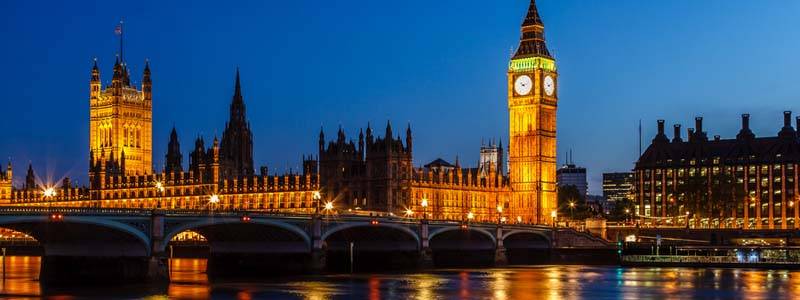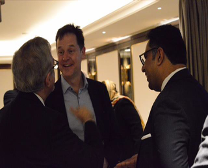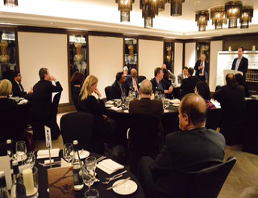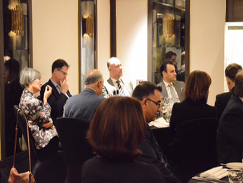
by Khalil Yousaf
I never really understood why people did not take the time to park properly. I had just driven alongside a row of cars parked in front of the May Fair Hotel in Mayfair, London. They took up far more space than they should. I was wondering whether any of the dignatories had arrived in one of them; I was due to meet some that evening. I managed to squeeze my car into the three-quarter length parking space that had been left by a particularly shiny limo and having tightened my tie, disembarked my car. I buttoned up my jacket and with my back straight and an indomitable stride, I walked the twenty or so yards to the hotel.
The May Fair Hotel is an elegant, hotel in the heart of Mayfair. It is probably one of the best boutique hotels in London. As I entered, I was immediately greeted by a small but chic sign, “Private Dinner Hosted by Shoaib Bajwa.”
I was attending an evening hosted by Mr. Shoaib Bajwa, the theme of the dinner was “Rise of Extremism/Populism in Societies Globally and Challenges for Political Leadership in 2017”. He is somewhat of an enigmatic character. Although sociable and charming, he occasionally comes across as quiet and reflective. The esteem that dignitaries from all walks of life were happy to give him on that evening was a clear testament to his personal relationships and in many ways, a validation of his unobtrusively personable style.

As I entered the private space, I did not quite know what to expect. I was greeted by a room with eight beautifully laden circular tables in the dining room, adjoined by a cossetted and well serviced reception area. The cocktails and hors d'oeuvres were just the indulgence I needed after a long and challenging day debating with a judge who in his own words just did not get technology these days.
The first person I met was Andrew Whitehead, a man who spent 35 years as a BBC correspondent in South Asia, editor of the World Service and is now Professor at the University of Nottingham and a visiting research fellow at the Kings India Institute at Kings College London. He is a tremendously interesting man with extensive experience ofIndia and Pakistan. He was due to leave the next week for a tour lasting a few months. He was interested in my views about the BBC; although in large part I am a fan, I was nevertheless interested in being diplomatic!
I also met with Richard Heller, an author, political journalist, and writer with a passion for cricket; he had written a number on Pakistani Cricket with another prominent British journalist Peter Oborne. Before long I was joined by Lord (Jonathan) Oates, a member of the House of Lords. Lord Oates reminded me a little of Alistair Campbell, not just because they shared a similar calling but because they shared a similar directness and attention to the specifics. In the few minutes I spoke with him, I found Lord Oates to be a charming individual. His ‘of the people’ language left me feeling that he really understood the electorate.
Before too long, the formal proceedings began. They were introduced by Mr. Afzal Ashraf. He emceed the proceedings splendidly with a mixture of excellent research, wit and allure that is synonymous with his background as a senior ranking RAF Officer and a leading media commentator on international security matters.
After a warm introduction, the first speaker, Professor Matthew Goodwin, an associate fellow at Chatham House spoke eloquently about, politics, socialism, populism, and the rise of the right in EU and US. He was seated next tome and as I spoke with him throughout the evening, I found him to be fiercely intellectual and exceptionally well versed in politics.
The next speaker was Dr. Ayesha Siddiqa, a Research Associate at SOAS. She spoke passionately about radicalization in Punjab, Pakistan and stated multiple times that extremism is on the rise internationally. She also mentioned the killings of Shias, Christians, Hindus and Ahmadis. She did not hold out much hope of change, but she was nevertheless a passionate proponent of it. I could not help but feeling that if her craving for a better Pakistan alone was sufficient, she might have achieved it all by herself.
 The keynote speaker was Sir Nick Clegg, former British Deputy Prime Minister. I had the opportunity to meet Nick before when he was in 10 Downing Street. He was on Shoaib’s guest list for an Eid dinner in 2015. After a rousing introduction, the ex-Deputy Prime Minister was enthusiastically welcomed to address an audience that had been warmed-up and was eager to hear him speak. He started off calmly, almost staid but before long the flickers of brilliance that made him such a compelling politician soon began to shine through. On the day that Prime Minister Theresa May set out her vision for a post-Brexit in Britain, Mr. Clegg was soon in his element. 16 million people voted to remain in Europe, is not the Prime Minister of Britain supposed to be the Prime Minister for them too, he said? Healso touched base on rise of religious extremism globally and mentioned the killing of Shahbaz Bhatti and Christians in Syria.
The keynote speaker was Sir Nick Clegg, former British Deputy Prime Minister. I had the opportunity to meet Nick before when he was in 10 Downing Street. He was on Shoaib’s guest list for an Eid dinner in 2015. After a rousing introduction, the ex-Deputy Prime Minister was enthusiastically welcomed to address an audience that had been warmed-up and was eager to hear him speak. He started off calmly, almost staid but before long the flickers of brilliance that made him such a compelling politician soon began to shine through. On the day that Prime Minister Theresa May set out her vision for a post-Brexit in Britain, Mr. Clegg was soon in his element. 16 million people voted to remain in Europe, is not the Prime Minister of Britain supposed to be the Prime Minister for them too, he said? Healso touched base on rise of religious extremism globally and mentioned the killing of Shahbaz Bhatti and Christians in Syria.
It left me musing that he had left British politics too soon. When I spoke with him afterwards and encouraged him toremain in politics, not for himself but for the service of the people he told me that he would not "reheat old coffee". The world welcomes tea much more widely than coffee I thought to myself. I had the distinct impression that aninternational institution would soon to benefit from a man who still has so much to offer. On the other hand, maybe I just wanted to have that impression.
Dinner was exquisite. Succulent meat that fell off the bone, juicy fish with the subtle aroma that which can only be associated with the freshest delicacies. The vegetables were not too soft, not too crispy but prepared and presented as perfectly one would expect from the high calibre chefs who embellished the bustling kitchens of the May Fair Hotel.
The desert was blissful, made even more pleasant by the delightful company of Ms. Alma Angotti. She is a lawyer but currently a senior executive of a global advisory services company in Washington DC. She is a Democrat. But not just any Democrat. A passionate Democrat of the highest order. I was amazed to know that she was also filmed for Martin Scores’ film ‘The Wolf of Wall Street’.

Mr. Maajid Khan, a well-dressed and striking individual who I instantly predicted as having political aspirations, made the mistake of opening a conversation with Ms. Angotti with an irreversible statement; he said he was a supporter of Trump. What ensued was scholarly carnage as the ex-SEC executive systematically dismantled every motive, every aim, and every thought in support of ‘Team Trump’. I did not participate, but my right ear was fixed to the erudite splendour of an impressively capable lady in her element. Mr. Khan was nevertheless graceful andamiable throughout; I am sure he will succeed in whatever he does.
I did not get a chance to speak with Shoaib very much that evening other than to thank him. But I very muchenjoyed the evening. I enjoyed the intellectual discussion, the aspiration, and the company of the 40 or so guests who were, academics, historians, journalists, diplomats, writers, lawyers and politicians. They had achieved so much in their professional careers. It made me more determined than ever to work towards an opportunity to do something brilliant for Britain and of course my family.
As the evening drew to a close, many questions had been posed that evening and most remained unanswered apart from one. Not a single limousine belonged to Sir Nick Clegg or any other dignitary. As I walked past them outside the hotel to the car, I saw Mr. Clegg adeptly using an app on his phone. He was ordering an uber home.
Khalil Yousaf is a senior corporate lawyer, an activist for refugee rights in London and he was a parliamentary candidate in 2019 General Elections. This article was written in 2017 but is getting published for the first time.
I never really understood why people did not take the time to park properly. I had just driven alongside a row of cars parked in front of the May Fair Hotel in Mayfair, London. They took up far more space than they should. I was wondering whether any of the dignatories had arrived in one of them; I was due to meet some that evening. I managed to squeeze my car into the three-quarter length parking space that had been left by a particularly shiny limo and having tightened my tie, disembarked my car. I buttoned up my jacket and with my back straight and an indomitable stride, I walked the twenty or so yards to the hotel.
The May Fair Hotel is an elegant, hotel in the heart of Mayfair. It is probably one of the best boutique hotels in London. As I entered, I was immediately greeted by a small but chic sign, “Private Dinner Hosted by Shoaib Bajwa.”
I was attending an evening hosted by Mr. Shoaib Bajwa, the theme of the dinner was “Rise of Extremism/Populism in Societies Globally and Challenges for Political Leadership in 2017”. He is somewhat of an enigmatic character. Although sociable and charming, he occasionally comes across as quiet and reflective. The esteem that dignitaries from all walks of life were happy to give him on that evening was a clear testament to his personal relationships and in many ways, a validation of his unobtrusively personable style.

R to L Mr. Shoaib Bajwa and Sir Nick Clegg with another guest
As I entered the private space, I did not quite know what to expect. I was greeted by a room with eight beautifully laden circular tables in the dining room, adjoined by a cossetted and well serviced reception area. The cocktails and hors d'oeuvres were just the indulgence I needed after a long and challenging day debating with a judge who in his own words just did not get technology these days.
The first person I met was Andrew Whitehead, a man who spent 35 years as a BBC correspondent in South Asia, editor of the World Service and is now Professor at the University of Nottingham and a visiting research fellow at the Kings India Institute at Kings College London. He is a tremendously interesting man with extensive experience ofIndia and Pakistan. He was due to leave the next week for a tour lasting a few months. He was interested in my views about the BBC; although in large part I am a fan, I was nevertheless interested in being diplomatic!
I also met with Richard Heller, an author, political journalist, and writer with a passion for cricket; he had written a number on Pakistani Cricket with another prominent British journalist Peter Oborne. Before long I was joined by Lord (Jonathan) Oates, a member of the House of Lords. Lord Oates reminded me a little of Alistair Campbell, not just because they shared a similar calling but because they shared a similar directness and attention to the specifics. In the few minutes I spoke with him, I found Lord Oates to be a charming individual. His ‘of the people’ language left me feeling that he really understood the electorate.
Before too long, the formal proceedings began. They were introduced by Mr. Afzal Ashraf. He emceed the proceedings splendidly with a mixture of excellent research, wit and allure that is synonymous with his background as a senior ranking RAF Officer and a leading media commentator on international security matters.
After a warm introduction, the first speaker, Professor Matthew Goodwin, an associate fellow at Chatham House spoke eloquently about, politics, socialism, populism, and the rise of the right in EU and US. He was seated next tome and as I spoke with him throughout the evening, I found him to be fiercely intellectual and exceptionally well versed in politics.
The next speaker was Dr. Ayesha Siddiqa, a Research Associate at SOAS. She spoke passionately about radicalization in Punjab, Pakistan and stated multiple times that extremism is on the rise internationally. She also mentioned the killings of Shias, Christians, Hindus and Ahmadis. She did not hold out much hope of change, but she was nevertheless a passionate proponent of it. I could not help but feeling that if her craving for a better Pakistan alone was sufficient, she might have achieved it all by herself.
 The keynote speaker was Sir Nick Clegg, former British Deputy Prime Minister. I had the opportunity to meet Nick before when he was in 10 Downing Street. He was on Shoaib’s guest list for an Eid dinner in 2015. After a rousing introduction, the ex-Deputy Prime Minister was enthusiastically welcomed to address an audience that had been warmed-up and was eager to hear him speak. He started off calmly, almost staid but before long the flickers of brilliance that made him such a compelling politician soon began to shine through. On the day that Prime Minister Theresa May set out her vision for a post-Brexit in Britain, Mr. Clegg was soon in his element. 16 million people voted to remain in Europe, is not the Prime Minister of Britain supposed to be the Prime Minister for them too, he said? Healso touched base on rise of religious extremism globally and mentioned the killing of Shahbaz Bhatti and Christians in Syria.
The keynote speaker was Sir Nick Clegg, former British Deputy Prime Minister. I had the opportunity to meet Nick before when he was in 10 Downing Street. He was on Shoaib’s guest list for an Eid dinner in 2015. After a rousing introduction, the ex-Deputy Prime Minister was enthusiastically welcomed to address an audience that had been warmed-up and was eager to hear him speak. He started off calmly, almost staid but before long the flickers of brilliance that made him such a compelling politician soon began to shine through. On the day that Prime Minister Theresa May set out her vision for a post-Brexit in Britain, Mr. Clegg was soon in his element. 16 million people voted to remain in Europe, is not the Prime Minister of Britain supposed to be the Prime Minister for them too, he said? Healso touched base on rise of religious extremism globally and mentioned the killing of Shahbaz Bhatti and Christians in Syria.It left me musing that he had left British politics too soon. When I spoke with him afterwards and encouraged him toremain in politics, not for himself but for the service of the people he told me that he would not "reheat old coffee". The world welcomes tea much more widely than coffee I thought to myself. I had the distinct impression that aninternational institution would soon to benefit from a man who still has so much to offer. On the other hand, maybe I just wanted to have that impression.
Dinner was exquisite. Succulent meat that fell off the bone, juicy fish with the subtle aroma that which can only be associated with the freshest delicacies. The vegetables were not too soft, not too crispy but prepared and presented as perfectly one would expect from the high calibre chefs who embellished the bustling kitchens of the May Fair Hotel.
The desert was blissful, made even more pleasant by the delightful company of Ms. Alma Angotti. She is a lawyer but currently a senior executive of a global advisory services company in Washington DC. She is a Democrat. But not just any Democrat. A passionate Democrat of the highest order. I was amazed to know that she was also filmed for Martin Scores’ film ‘The Wolf of Wall Street’.

L to R: Ms. Lucy Peck, Sir Nick Clegg, Andrew Brown and M Aminudin
Mr. Maajid Khan, a well-dressed and striking individual who I instantly predicted as having political aspirations, made the mistake of opening a conversation with Ms. Angotti with an irreversible statement; he said he was a supporter of Trump. What ensued was scholarly carnage as the ex-SEC executive systematically dismantled every motive, every aim, and every thought in support of ‘Team Trump’. I did not participate, but my right ear was fixed to the erudite splendour of an impressively capable lady in her element. Mr. Khan was nevertheless graceful andamiable throughout; I am sure he will succeed in whatever he does.
I did not get a chance to speak with Shoaib very much that evening other than to thank him. But I very muchenjoyed the evening. I enjoyed the intellectual discussion, the aspiration, and the company of the 40 or so guests who were, academics, historians, journalists, diplomats, writers, lawyers and politicians. They had achieved so much in their professional careers. It made me more determined than ever to work towards an opportunity to do something brilliant for Britain and of course my family.
As the evening drew to a close, many questions had been posed that evening and most remained unanswered apart from one. Not a single limousine belonged to Sir Nick Clegg or any other dignitary. As I walked past them outside the hotel to the car, I saw Mr. Clegg adeptly using an app on his phone. He was ordering an uber home.
Khalil Yousaf is a senior corporate lawyer, an activist for refugee rights in London and he was a parliamentary candidate in 2019 General Elections. This article was written in 2017 but is getting published for the first time.
